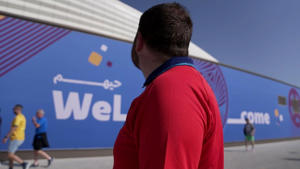© BBC “I don’t feel I have to choose between being a gay man and an England fan,” says Phil
Phil, 39, is a lifelong football fan who’s in Qatar for his fourth World Cup in a row. Qatar has said “everyone is welcome”, but as a gay man travelling in a country where same-sex relationships are criminalised, he tells us through his diary how the experience has been challenging.
© BBC
Tuesday 22 November, 18:00 – Heathrow Terminal 5
On the way to the World Cup in Russia in 2018, the airport was absolutely packed with fans from around the world, but it just looks like an average Tuesday here tonight.
I’ve been an England fan for longer than I’ve known what the word “gay” means. My first memories of football are of watching the World Cup in 1990 at my grandparents’ house, and being allowed to stay up late for England games.
I’m aware that my decision to go to Qatar puts me in the substantial minority of gay England fans – but if we’re serious that the game is for everyone, I’m not going to let Qatar’s despicable LGBT rights stop me from enjoying the game that I love. I don’t feel I have to choose between being a gay man and an England fan.
I accept that I’m saying that from a position of extreme privilege. There’s a layer of protection that applies to me as a western foreigner that wouldn’t apply to LGBTQ Qataris. That’s what I’m most conflicted about.
Wednesday 23 November, about 14:30 – Khalifa International Stadium
I’m just walking out of the stadium after the first game, Japan 2-1 Germany. A superb game.
But it’s all very odd here. There’s a sterile atmosphere inside the stadiums, no-one seems to quite know what to do. Security are managing things quite closely – there’s a specific area to have your flags and banners examined before going in.
© Reuters Security is high at the stadiums in Doha
Thursday 24 November, 01:15
On the metro tonight I saw a sign saying football is “a vehicle for respecting human rights”, to which the obvious question is – but whose human rights?
There is a tonne of security inside the stadiums, more than I’ve seen at any of the other tournaments. It’s curious because the atmosphere here seems to be non-threatening. So what exactly are they looking out for?
20:10 – Souq Waqif
I spoke to a gay fan from the Netherlands in a bar earlier. Like me, he feels somewhat conflicted about being here.
I also had one of my dating apps open today and got several messages from Saudi men. So the Qataris may pretend that queer life in the Middle East is dead, but online it’s alive and well.
© PA Media Fans have been celebrating in Doha’s Souq Waqif
Saturday 26 November, 00:15 – Al Bayt Stadium
Just finished watching England v USA. At half-time I bumped into an England fan who was wearing a rainbow ribbon, and asked him if he had any issues getting into the stadium. Apparently he was looked over by three or four different people, but was then told, “oh, it’s OK now”. I’ve also seen a couple of fans in USA jerseys with rainbow numbers on the back, so I guess “green shoots” is the phrase.
I’ve been thinking about that “football is for everyone” slogan quite a lot since I’ve been here. I think the locals genuinely do believe it, they just don’t consider gay fans as part of the equation. It’s not necessarily homophobic, it’s just such a taboo topic that we’re invisible.
It’s one of the reasons a lot of my fellow LGBT fans haven’t been able to come out here – they’ve felt, for understandable reasons, excluded.
About 14:30 – Al Janoub Stadium
I’m walking out of the stadium at the end of the Australia v Tunisia game.
Just after half-time, a group of Tunisian fans unfurled a massive flag saying “Free Palestine”. Nothing wrong with that – but when officials talk about keeping politics out of sport, and then a flag that size is allowed in by the flag police at the stadium.
© EPA During the Australia v Tunisia game, fans unfurled a banner that read “Free Palestine”
Almost 22:00 – outskirts of Doha
We’ve watched France vs Denmark in downtown Doha with groups of Mexican, Argentinian and European fans, talking about how this compares to other World Cups. For me, there’s a lot to like about how Qatar have run this from a purely football perspective, and on the field there’ve been some good games.
But what I keep coming back to is the sheer hypocrisy of the messaging, “say no to discrimination”. I’ve met a couple of people who’ve said, “you’re perfectly safe here, why does it matter that you’re gay?”.
I know I do have that privilege of being relatively safe compared to LGBT Qataris, but unless you’ve actually walked in our shoes, and have felt that feeling of unease, of feeling excluded, it’s very hard to describe.
Sunday 27 November, 05:15 – Doha Hamad International Airport
I’m about to get on my flight back to the UK, so, signing off for the last time in Qatar.
When Qatar was awarded the World Cup in 2010, there was an outcry – but it was more about the corruption allegations, not LGBT rights. Perhaps that’s a measure of the progress within Europe and the UK.
Have I ever felt concerned for my safety here? No. Do I think I would’ve done, under other circumstances? Also no again. But do I feel that my experience here has been compromised by knowing what happens to the local LGBT population? Yes, I do.
We’re told to just “focus on the football”, but there are things in life that are more important.
© Reuters Qatar’s hosting of the World Cup has been controversial since it was first announced in 2010
As told to Josh Parry and Ashitha Nagesh. Phil shared his experience with us through voice notes on an encrypted messaging app. We are not publishing his full name.













